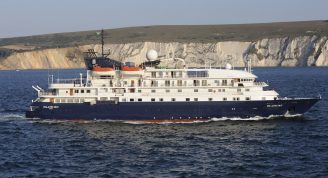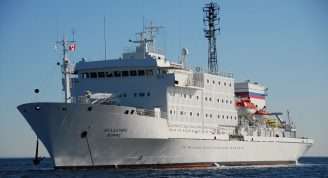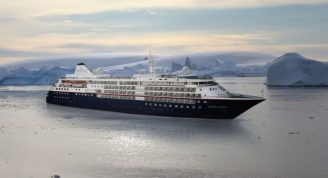Description
Join us for a remarkable experience that takes you through the western Antarctic Peninsula, through Elephant Island to South Georgia. The South Georgia and Antarctica air-cruise allows you to sail through the nutrient-rich waters and, each day, disembark with our expert polar guides having time to either hike, snowshoe, or kayak in bays nearby. As we make our way to South Georgia, you will follow in the footsteps of famous Antarctic explorers, like Ernest Shackleton, and learn about their daring southerly adventures. After reaching South Georgia, visit some of the largest colonies of penguins in the world, including the king penguin, and see the nesting grounds of thousands of albatrosses.
Trip Name
South Georgia & the Falkland Islands - A True Adventure Experience
Days
18
Overview
Vessel Type: Expedition
Length: 90.7 m - 298 ft.
Passenger Capacity: 100 (only 69 passengers for Air-Cruise operations)
Built: 2018
MV Magellan Explorer features 50 passenger suites and cabins in five categories of accommodation, including dedicated single cabins. The cabins are very spacious, ranging in size from 40 m2 (440 sq. ft.) to 20 m2 (220 sq. ft.). All double cabins have two twin beds that can be configured as one queen-size bed, offering great flexibility to our guests. 42 cabins feature a large window and a private balcony, while 8 cabins feature a porthole. All cabins feature a private bathroom and a sitting area.
Public areas include a large, forward-facing observation lounge, an observation deck, a dining room that accommodates all guests and expedition staff in a single sitting, two meeting rooms, a gift shop, a protected outdoor barbecue area, a gym, and a sauna. The bow of the ship is accessible to guests to offer expansive views during exploration. Optional adventure activities, such as kayaking and snowshoeing, are available.
Specific measures have been taken to minimize MV Magellan Explorer’s carbon footprint, including state-of-the-art engines that meet MARPOL’s stringent Tier III emission standards. To minimize fuel consumption, a waste heat recovery system recycles the heat produced by the ship’s engines and repurposes it to power the ship’s heating system and to warm the water used on board.









